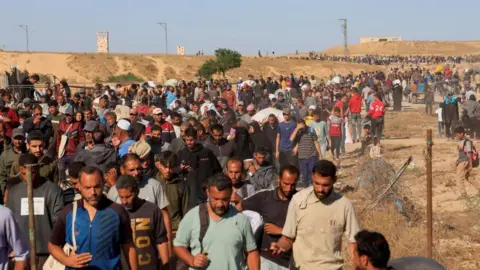In the latest tragic incident from the ongoing conflict in Gaza, reports indicate that several Palestinians have been killed near an aid distribution site, exacerbating an already dire humanitarian crisis. Eyewitness accounts from Palestinian journalists suggest that Israeli troops opened fire on the individuals gathered at the site, although precise details remain murky due to a significant internet outage that has affected communication across the region. This incident, which occurred as people awaited essential aid, reflects the escalating tensions and violence that have marked this prolonged period of unrest.
As of Saturday, information regarding the specifics of the shooting remains limited. Despite the severity of the situation, the Israeli Defense Forces (IDF) have yet to issue a statement regarding the incident. Previously, the Israeli military has justified similar actions by claiming that troops discharged their weapons in response to perceived threats from individuals approaching them. However, the actions during the aid distribution raise questions about the broader context of security and necessity in such volatile situations, where many individuals were merely seeking food and supplies.
The aid distribution itself, managed by the Gaza Humanitarian Foundation—which operates with the backing of Israel and the United States—was reportedly closed until Sunday, leaving many individuals unaware that they were gathering in vain. This misunderstanding has led to increased confusion among the Palestinian populace, exacerbated by the fact that the organization’s updates are only accessible to those with e-sim cards due to the current blackout. Consequently, this breakdown in communication only intensifies the chaotic conditions under which aid is being distributed, illustrating the desperation and uncertainty faced by individuals in Gaza.
As many individuals camp out near aid distribution sites, particularly one located in the Netzarim Corridor and several others further south, concern escalates about the potential for violent encounters. This unrest is mirrored by growing apprehension from medical professionals and humanitarian organizations regarding the operational capacity of hospitals in southern Gaza, such as Nasser Hospital in Rafah. Reports have indicated that the hospital’s staff is dwindling drastically, with many healthcare workers having evacuated amidst growing threats in the surrounding areas.
This atmosphere of fear and instability sheds light on the challenges facing healthcare facilities. If Nasser Hospital cannot maintain operational capabilities, it will eliminate the only referral point in the region for patients needing specialized care, including critical services such as blood transfusions. Urgent calls for international intervention and resupply have emerged from healthcare professionals like Dr. Feroze Sidwa, who has emphasized that protecting and supporting Nasser Hospital is a moral imperative in light of ongoing humanitarian needs.
Another physician, Dr. Victoria Rose, amplified the urgency of this situation by highlighting that the facility possesses critical medical equipment—an intensive treatment unit, CT scanner, oxygen generation, and a blood bank—the unavailability of which would lead to catastrophic outcomes for patients. With the looming threat of a complete operational shutdown, her comments underscore the dire consequences should the situation remain unaddressed.
Since the onset of hostilities initiated by an Israeli military campaign in retort to the Hamas-led cross-border attack on October 7, 2023, the landscape of Gaza has been marred by extraordinary loss, with reports showing over 55,207 fatalities according to the health ministry administered by Hamas. This staggering statistic encapsulates the severe human toll of the conflict, illustrating the urgent need for international attention, humanitarian aid, and diplomatic action to alleviate the crisis faced by the Palestinian people.
In summary, the incident near the aid distribution site highlights the ongoing tragedy in Gaza amidst a backdrop of violence, confusion, and desperation. With the Iranian military campaign ongoing and the healthcare infrastructure critically jeopardized, the calls for global intervention and support resonate stronger than ever, emphasizing the imperative to protect life, provide essential services, and seek a path toward a peaceful resolution.



